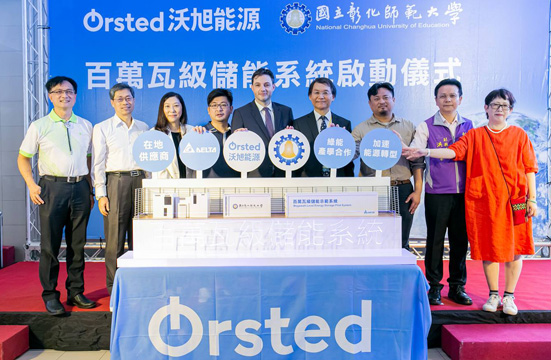Ørsted helps Taiwan university in IoT smart energy research
- June 30, 2020
- Steve Rogerson

Danish offshore wind company Ørsted has inaugurated a MW-size energy storage pilot at the National Changhua University of Education (NCUE) in Taiwan to enable research to improve grid efficiency and help the campus become an IoT smart-grid demonstration zone.
The pilot system is on the university’s Baoshan campus and is the first of its kind, fully funded by a private company, representing a collaboration among industry, academic and government and a milestone for green energy development. The participating parties include NCUE, Changhua County Government and local energy technology company Delta.
“Ørsted’s vision is to create a world that runs entirely on green energy,” said Matthias Bausenwein, president of Ørsted Asia Pacific. “Leveraging our nearly 30 years of offshore wind expertise and global best practices, we introduced the energy storage pilot system with an aim to drive development of an offshore wind value chain and work to build a renewable energy ecosystem in Taiwan.”
He said the way to balance and operate the grid needed to be more agile and flexible.
“The development of energy storage system in the future will help enhance grid operations as well as accelerate the integration of renewable energy supply and demand to further realise Taiwan’s target of 20% renewables in its energy mix,” he said.
Ørsted began the pilot project in 2017 and has since then worked closely with NCUE on its delivery.
“Ørsted is going all out in supporting Taiwan’s energy transition,” said Christy Wang, general manager of Ørsted in Taiwan. “We began promoting academic-industry collaboration as early as during the grid allocation period for the Greater Changhua offshore wind projects and actively helped the academic communities and industries in Taiwan take the first step in energy storage study. The inauguration of the MW-size energy storage pilot system demonstrated that Ørsted is not only building the offshore wind farms in Taiwan to provide clean energy but also made extra investment in the energy storage pilot system to fulfil our commitment to transferring technology and cultivating local talents in the green energy field to help set Taiwan at the forefront of the green energy industry together with Ørsted.”
Together with the NCUE Energy Research Center, which Ørsted sponsored to set up in 2018, the energy storage pilot will provide resources to enable participating academic, industrial and local communities to conduct research and gather extensive data and insights. The data will be leveraged for grid enhancement in Taiwan and enable participating parties to seize energy storage business opportunities in the future.
“We really appreciate Ørsted for the great support for technology sharing, knowledge transfer and sponsorship to set up this energy storage pilot system and the Ørsted–NCUE Smart Energy Centre,” said Kuo Yen-Kuang, principle of NCUE. “The project significantly will improve our school’s energy efficiency and enable more than 20 extended studies spanning from smart grid, micro-grid technologies, power electronics to strategic management of energy storage system.”
Kuo said the Baoshan campus will become an IoT smart-grid demonstration zone, using the energy pilot storage system to regulate power usage on campus, while sensors will be installed on major electronic equipment to collect data for further analysis. The results of these studies will be used to develop energy usage prediction models to optimise power efficiency on the campus and establish NCUE into a green energy research hub.
The energy storage system (ESS) was designed, built and implemented by Delta, and includes a 1MW power conditioning system, a 1MWh lithium-ion battery ESS and an energy management system.
“Delta is pleased to participate in this project with the support of global offshore wind leader Ørsted,” said JJ Chang, general manager of Delta’s energy infrastructure group. “We are glad to leverage our system integration and operation and maintenance capability to assist NCUE in designing and building a smart energy storage system that can enable grid application researches. We look forward to cooperating further with Ørsted and other stakeholders to contribute to energy transition in Taiwan.”
The MW-size storage system will be managed by NCUE, with Ørsted sponsoring a full-time research assistant within the College of Engineering to perform monitoring and coordination of the research activities.
The system passed a rigorous 120-hour on-going stability test after completion, as well as several validations, including the grid-connection assessment by Taiwan Power Company, and fire protection equipment tests.





